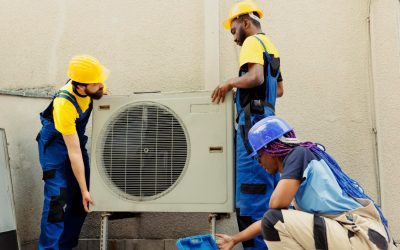Could Dry Air Be Making You Sick?
The winter air is well known for bringing along colds, sinus infections, flu viruses, and an assortment of other ailments. Your health insurance gets put to good use during this time of year, but what if you could help eliminate some of the sicknesses? Your doctor may recommend taking a daily multivitamin and washing your hands every thirty minutes. However, your air conditioning repair technician may propose a different solution.
They may suggest that your furnace is to blame for many of your common illnesses in the winter.
How does dry air make you sick?
When the humidity is low outside, the air tends to suck up moisture from whatever sources it can find. Unfortunately, it may even pull the moisture right out of your body, mostly from your skin or your sinuses. By drying out your nasal cavities, you’re leaving yourself far more prone to bacteria.
In general, your body protects itself from airborne illnesses by trapping bacteria with the mucus inside of your nose. A body that’s too dry fails to produce enough mucus to stop these invaders from entering your body. Whenever you breathe in, you’re actually inhaling these infection-causing agents directly into your lungs.
In the winter, the dry air tends to hold onto bacteria longer than it does in the summer. This means that you’re being exposed to far more bacteria, bringing them into your body at a faster rate, and ultimately exposing your immune system to too much.
Simply put, your immune system can’t keep up when the mucus isn’t available to do its job.
Keep in mind that you may be experiencing respiratory issues as a direct result of your furnace as well. Running the heat more often means that your furnace is stirring up more dust and allergens. Homeowners who combine those allergens with the dry air may experience more nasal irritation, dry or irritated throats, and allergy symptoms.
This is why it’s crucial to make sure that your air filter gets changed regularly during the winter months. The dry air combined with an increase in allergens can cause some serious health issues through the cold winter months.
There are a few steps you can take to help prevent these issues if you know where to look. Take a closer look with us at how your furnace may be drying out the air and making you sick.
How does the furnace dry out the air?
During the winter, we’re a lot more apt to turn up the heat so we can sleep comfortably at night. Keeping out the bitter cold is our primary goal during the snowy season. Unfortunately, it may be coming at a significant cost.
When the furnace runs more frequently, the air in our homes tends to be drier which can cause a host of health issues. Winter air already holds less moisture than summer air due to the major temperature drop. Humidity varies based on the temperature, and warm air can hold more moisture than cold air. Thus, when winter rolls around, the humidity tends to already be at an all-time low.
Hearing the furnace kick on constantly is another sign that your air is about to be a whole lot drier. In most situations, the furnace pulls cold air from the outdoors into the system in order to warm it. From there, it redirects the air into your home. The cold air brought in by the furnace is already dry, and it creates a consistently arid atmosphere inside your home.
If your unit is running the way it’s supposed to, this may be the only reason you have dry air inside your home. Many homes may be experiencing a more severe issue due to other related problems though.
Where else can dry air come from?
If it isn’t the direct result of your furnace, you may be experiencing dry air from a number of other sources. Consider how your home is set up and evaluate these key areas to see if you may be unintentionally drying out the air in your home.
Leaky Home
Older homes tend to be more subject to leaking air, which can make your home very warm in the summer and frigid in the winter. A leaky home is bad for your electric or gas bill, but it’s also terrible for the quality of your air. Your HVAC system is going to have to work twice as hard to make up for the air that’s slipping in from outdoors.
Unfortunately, this can mean even drier air in the winter. Your furnace is already pumping in outdoor air to create warmth, but you have an excess of winter air now entering into your home.
Be sure to check around your windows and doors for any leaks. If you place your hand up against the seals, you may feel the air coming right into your home. This is a good time to consider adding weather stripping or replacing old windows. Not only will your health improve, but you will save more on the monthly costs of heating and cooling your home.
Leaky Ducts
You may be allowing the cold air to seep in without even knowing it. Even a pinhole leak in one of your air ducts can contribute to drier indoor air. Similar to the dilemma with a leaky house, your air ducts may be raising the cost of your heating and cooling while simultaneously making your home less comfortable.
This is a lot more likely if your ducts are in an area of your home that is not climate-controlled, such as an attic. If you can get to your air ducts, you may be able to determine if there are leaks on your own. Simply inspect them by keeping your hands near the ductwork while the furnace is running to see if you can feel hot air coming from any specific spots. You may even be able to visually see where the leaks are coming from.
Some homeowners may prefer to enlist the help of a professional to inspect their ductwork. This leaves less room for error and determines the extent of any damage. In the end, repairing those leaks is often best left to the experts anyway.
Excess Ventilation
Are you overly concerned about ventilating your home? While some ventilation is a good idea, many homeowners have too much of a good thing. You’re more likely to spend too much on heating and cooling your home if you’re constantly ventilating the property.
You will need to find some balance with ventilation that leaves your home comfortable and better cared for. Cutting back on the amount of fresh air that’s cycled into with excess aeration your home can reduce some of the dry air you experience in winter.
How do you fix dry air?
For most people, turning off the heat in the winter isn’t really an option. Snuggling under six quilts is only practical for so long before you need to start heating up the air inside your home again. Instead, you may need to take some other steps to restore moisture into your home.
First, you may consider putting in a humidifier. Even a tabletop humidifier can help to restore moisture to the air, your skin, and your nasal passages. This one simple step helps to restore the moisture almost instantly. Because the machines tend to run continuously, you have an effective means of boosting humidity all through the day and night.
You could also install a whole-house humidifier to manage the humidity levels year-round, with very little effort on your part. A Classic Air Conditioning and Heating technician should be able to assist with this installation.
Second, you can take actions throughout the day to help boost the humidity levels of your home. For example, you may want to boil more water or take longer and hotter showers. The steam produced by both of these is captured by the air, making it slightly more humid. You may even be able to run the dishwasher or complete more loads of laundry as an effective means of restoring moisture into the air.
Taking care of the humidity levels of your home can help to improve the air quality and give you an immune boost as well. If you’re tired of getting sick this winter, maybe some of these simple changes in your routine would restore your body’s natural defenses better than a multivitamin.





